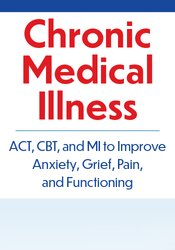
Trending Topics:
×

When clients have chronic health problems, therapy becomes even more complicated.
Already struggling with their mental health symptoms, these clients are confused, frustrated, and demoralised by their medical illness. It interferes with their self-efficacy and functioning, and it creates profound shifts in their identify and relationships.
Of course, they need their medical providers to help manage their condition.
But they also need you.
Faced with complicated terminology, unappealing decisions regarding treatment options, and challenging lifestyle changes, you might feel as intimidated and hopeless as your clients.
Now you can become a source of help and hope for your clients with chronic medical illness. During a full day of comprehensive training, Jessica Vanderlan, PhD will walk you step by step through the latest evidence-based strategies to improve mood, pain, and functioning. You’ll gain the skills you need to confidently implement:
PURCHASE TODAY to meet the growing demand for behavioural treatment interventions for clients coping with chronic medical illness!
All members of the PESI, Inc. planning committee have provided disclosures of financial relationships with ineligible organizations and any relevant non-financial relationships prior to planning content for this activity. None of the committee members had relevant financial relationships with ineligible companies or other potentially biasing relationships to disclose to learners. For speaker disclosures, please see the faculty biography.
NOTE: Tuition includes one free CE Certificate (participant will be able to print the certificate of completion after passing the online post-test (80% passing score) and completing the evaluation). Instructional methods will include PowerPoint, didactic lecture, and others.
Continuing Education Information: Listed below are the continuing education credit(s) currently available for this non-interactive self-study package. Program content is reviewed periodically per accrediting board rules for currency and appropriateness for credit. Credit approvals are subject to change. Please note, your licensing board dictates whether self-study is an acceptable form of continuing education, as well as which credit types are acceptable for continuing education hours. Please refer to your licensing board's rules and regulations. If your profession is not listed, please contact your licensing board to determine your continuing education requirements and check for reciprocal approval.
For other credit inquiries not specified below, please contact info@pesi.com or 800-844-8260 before purchase.
Materials that are included in this course may include interventions and modalities that are beyond the authorized practice of your profession. As a licensed professional, you are responsible for reviewing the scope of practice, including activities that are defined in law as beyond the boundaries of practice in accordance with and in compliance with your profession's standards.
For Planning Committee disclosures, please see the statement above. For speaker disclosures, please see the faculty biography.
Earn up to 6.25 CE hours. Please see below, for more details, as credit amounts vary by jurisdiction and profession.
PESI, Inc. is approved by the Canadian Counselling and Psychotherapy Association to offer continuing education for counsellors and psychotherapists. PESI, Inc. maintains responsibility for the program. This self-study activity is approved for 6.0 credit hours.

PESI, Inc., #1062, is approved as an ACE provider to offer social work continuing education by the Association of Social Work Boards (ASWB) Approved Continuing Education (ACE) program. Regulatory boards are the final authority on courses accepted for continuing education credit. ACE provider approval period: January 27, 2023 - January 27, 2026. Social workers completing this course receive 6.25 Clinical continuing education credits.
Course Level: Intermediate Format: Recorded asynchronous distance. Full attendance is required; no partial credits will be offered for partial attendance.
Canadian Social Workers: Canadian provinces may accept activities approved by the ASWB for ongoing professional development.
PESI, Inc. is approved by the Canadian Psychological Association to offer continuing education for psychologists. PESI, Inc. maintains responsibility for the program. This program is approved for 6.0 self-study continuing education hours. Full credit statement at: www.pesi.com/cpa-statement
This self-study activity qualifies for 6.25 continuing education clock hours as required by many national and local licensing boards and professional organizations. Save your activity advertisement and certificate of completion, and contact your own board or organization for specific requirements.
| File type | File name | Number of pages | |
|---|---|---|---|
| Manual - Chronic Medical Illness (5.5 MB) | 149 Pages | Available after Purchase | |
| Manual - Chronic Medical Illness - French (5.5 MB) | 149 Pages | Available after Purchase | |
| Manual - Chronic Medical Illness - Italian (5.5 MB) | 149 Pages | Available after Purchase | |
| Manual - Chronic Medical Illness - German (5.5 MB) | 149 Pages | Available after Purchase | |
| Manual - Chronic Medical Illness - Spanish (5.5 MB) | 149 Pages | Available after Purchase |

Jessica Vanderlan, PhD, is a licensed clinical psychologist and manager of the Siteman Psychology Service at the Siteman Cancer Center, where she provides therapy to patients with cancer and cancer caregivers and leads a psycho-oncology training program. She is a board member and director of education for the American Psychosocial Oncology Society and co-chair for the National Comprehensive Cancer Network’s distress guidelines panel. Dr. Vanderlan’s research focuses on psycho-oncology, distress screening, psychological functioning in gynecologic oncology, program development, and integrated psychological care. She is on the psychiatry faculty at the Washington University School of Medicine where she assists in training medical students and residents.
Speaker Disclosures:
Financial: Jessica Vanderlan has employment relationships with Siteman Psychology Service and Washington University. She receives a speaking honorarium from PESI, Inc. She has no relevant financial relationships with ineligible organizations.
Non-financial: Jessica Vanderlan serves on the board of American Psychosocial Oncology Society and the on the Distress Management Guidelines panel for NCCN.
Access never expires for this product.
For a more detailed outline that includes times or durations of time, if needed, please contact cepesi@pesi.com.
Visit our FAQ page at https://www.pesicanada.ca/faq or contact us at https://www.pesicanada.ca/contact-us.
Depression and Anxiety
Are they inevitable after diagnosis of an illness?
Satisfaction Guarantee
Your satisfaction is our goal and our guarantee. Concerns should be addressed to info@pesicanada.com.
Please wait ...